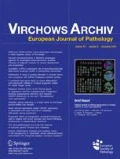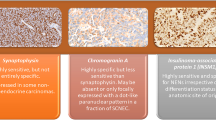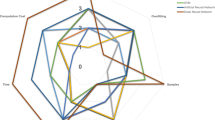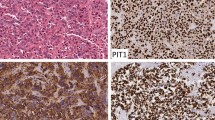Abstract
Approximately 5–10% of neuroendocrine tumors (NETs) of the gastroenteropancreatic system (GEP) have a hereditary background. The known inherited syndromes include multiple endocrine neoplasia type 1, neurofibromatosis type 1, von Hippel–Lindau disease, and the tuberous sclerosis complex. This review discusses for each of these syndromes the: (1) involved genes and specific types of mutations, (2) disease prevalence and penetrance, (3) affected neuroendocrine tissues and related clinical syndromes, (4) special morphological features of NETs and their putative precursor lesions. In addition, GEP-NETs clustering in individual families or associated with other malignancies without known genetic background are discussed.





Similar content being viewed by others
References
Alexakis N, Connor S, Ghaneh P, Lombard M, Smart HL, Evans J, Hughes M, Garvey CJ, Vora J, Vinjamuri S, Sutton R, Neoptolemos JP (2004) Hereditary pancreatic endocrine tumours. Pancreatology 4:417–433
Anderson RE (1966) A familial instance of appendiceal carcinoid. Am J Surg 111:738–740
Anlauf M, Perren A, Meyer CL, Schmid S, Saremaslani P, Kruse ML, Weihe E, Komminoth P, Heitz PU, Klöppel G (2005) Precursor lesions in patients with multiple endocrine neoplasia type 1-associated duodenal gastrinomas. Gastroenterology 128:1187–1198
Anlauf M, Garbrecht N, Henopp T, Schmitt A, Schlenger R, Raffel A, Krausch M, Gimm O, Eisenberger CF, Knoefel WT, Dralle H, Komminoth P, Heitz PU, Perren A, Klöppel G (2006) Sporadic versus hereditary gastrinomas of the duodenum and pancreas: distinct clinico-pathological and epidemiological features. World J Gastroenterol 12:5440–5446
Anlauf M, Schlenger R, Perren A, Bauersfeld J, Koch CA, Dralle H, Raffel A, Knoefel WT, Weihe E, Ruszniewski P, Couvelard A, Komminoth P, Heitz PU, Klöppel G (2006) Microadenomatosis of the endocrine pancreas in patients with and without the multiple endocrine neoplasia type 1 syndrome. Am J Surg Pathol 30:560–574
Anlauf M, Perren A, Henopp T, Rudolph T, Garbrecht N, Schmitt A, Raffel A, Gimm O, Weihe E, Knoefel WT, Dralle H, Heitz PU, Komminoth P, Klöppel G (2007) Allelic deletion of the MEN1 gene in duodenal gastrin and somatostatin cell neoplasms and their precursor lesions. Gut 56:637–644
Babovic-Vuksanovic D, Constantinou CL, Rubin J, Rowland CM, Schaid DJ, Karnes PS (1999) Familial occurrence of carcinoid tumors and association with other malignant neoplasms. Cancer Epidemiol Biomark Prev 8:715–719
Bassett JH, Forbes SA, Pannett AA, Lloyd SE, Christie PT, Wooding C, Harding B, Besser GM, Edwards CR, Monson JP, Sampson J, Wass JA, Wheeler MH, Thakker RV (1998) Characterization of mutations in patients with multiple endocrine neoplasia type 1. Am J Hum Genet 62:232–244
Bordi C, D’Adda T, Azzoni C, Ferraro G (1998) Pathogenesis of ECL cell tumors in humans. Yale J Biol Med 71:273–284
Bordi C, Corleto VD, Azzoni C, Pizzi S, Ferraro G, Gibril F, Delle FG, Jensen RT (2001) The antral mucosa as a new site for endocrine tumors in multiple endocrine neoplasia type 1 and Zollinger–Ellison syndromes. J Clin Endocrinol Metab 86:2236–2242
Brown NK, Smith MP (1973) Neoplastic diathesis of patients with carcinoid. Report of a case with four other neoplasms. Cancer 32:216–222
Calender A, Morrison CD, Komminoth P, Scoazec JY, Sweet KM, Teh BT (2004) Multiple endocrine neoplasia type 1. In: DeLellis RA, Lloyd RV, Heitz PU, Eng C (eds) Pathology and genetics: tumours of endocrine organs. WHO classification of tumors. IARC, Lyon, pp 218–227
Camp ER, Hochwald SN, Liu C (2004) FAP with concurrent duodenal adenomatous polyposis and carcinoid tumor. J Surg Oncol 87:187–190
Chandrasekharappa SC, Guru SC, Manickam P, Olufemi SE, Collins FS, Emmert-Buck MR, Debelenko LV, Zhuang Z, Lubensky IA, Liotta LA, Crabtree JS, Wang Y, Roe BA, Weisemann J, Boguski MS, Agarwal SK, Kester MB, Kim YS, Heppner C, Dong Q, Spiegel AM, Burns AL, Marx SJ (1997) Positional cloning of the gene for multiple endocrine neoplasia-type 1. Science 276:404–407
Chandrasekharappa SC, Teh B (2001) Clinical and molecular aspects of multiple endocrine neoplasia type 1. In: Dahia PLM, Eng C (eds) Genetic disorders of endocrine neoplasia. Karger, Basel, pp 50–80
Chen CC, Neugut AI, Rotterdam H (1994) Risk factors for adenocarcinomas and malignant carcinoids of the small intestine: preliminary findings. Cancer Epidemiol Biomark Prev 3:205–207
Chen F, Kishida T, Yao M, Hustad T, Glavac D, Dean M, Gnarra JR, Orcutt ML, Duh FM, Glenn G (1995) Germline mutations in the von Hippel–Lindau disease tumor suppressor gene: correlations with phenotype. Human Mutat 5:66–75
Cockman ME, Masson N, Mole DR, Jaakkola P, Chang GW, Clifford SC, Maher ER, Pugh CW, Ratcliffe PJ, Maxwell PH (2000) Hypoxia inducible factor-alpha binding and ubiquitylation by the von Hippel–Lindau tumor suppressor protein. J Biol Chem 275:25733–25741
Crossey PA, Richards FM, Foster K, Green JS, Prowse A, Latif F, Lerman MI, Zbar B, Affara NA, Ferguson-Smith MA (1994) Identification of intragenic mutations in the von Hippel–Lindau disease tumour suppressor gene and correlation with disease phenotype. Hum Mol Genet 3:1303–1308
Dabora SL, Jozwiak S, Franz DN, Roberts PS, Nieto A, Chung J, Choy YS, Reeve MP, Thiele E, Egelhoff JC, Kasprzyk-Obara J, Domanska-Pakiela D, Kwiatkowski DJ (2001) Mutational analysis in a cohort of 224 tuberous sclerosis patients indicates increased severity of TSC2, compared with TSC1, disease in multiple organs. Am J Hum Genet 68:64–80
Davoren PM, Epstein MT (1992) Insulinoma complicating tuberous sclerosis. J Neurol Neurosurg Psychiatry 55:1209
Dayal Y, Doos WG, O’Brien MJ, Nunnemacher G, DeLellis RA, Wolfe HJ (1983) Psammomatous somatostatinomas of the duodenum. Am J Surg Pathol 7:653–665
Dayal Y, Tallberg KA, Nunnemacher G, DeLellis RA, Wolfe HJ (1986) Duodenal carcinoids in patients with and without neurofibromatosis. A comparative study. Am J Surg Pathol 10:348–357
Dayal Y, Öberg K, Perren A, Komminoth P (2004) Somatostatinoma. In: DeLellis RA, Lloyd RV, Heitz PU, Eng C (eds) Pathology and genetics: tumours of endocrine organs. WHO classification of tumors. IARC, Lyon, pp 189–190
Eissele R, Anlauf M, Schäfer MKH, Eiden LE, Arnold R, Weihe E (1999) Expression of vesicular monoamine transporters in endocrine hyperplasia and endocrine tumors of the oxyntic stomach. Digestion 60:428–439
Emmert-Buck MR, Lubensky IA, Dong Q, Manickam P, Guru SC, Kester MB, Olufemi SE, Agarwal S, Burns AL, Spiegel AM, Collins FS, Marx SJ, Zhuang Z, Liotta LA, Chandrasekharappa SC, Debelenko LV (1997) Localization of the multiple endocrine neoplasia type I (MEN1) gene based on tumor loss of heterozygosity analysis. Cancer Res 57:1855–1858
Evans DGR, Komminoth P, Scheithauer BW, Peltonen J (2004) Neurofibromatosis type 1. In: DeLellis RA, Lloyd RV, Heitz PU, Eng C (eds) Pathology and genetics: tumours of endocrine organs. WHO classification of tumors. IARC, Lyon, pp 243–248
Francalanci P, Diomedi-Camassei F, Purificato C, Santorelli FM, Giannotti A, Dominici C, Inserra A, Boldrini R (2003) Malignant pancreatic endocrine tumor in a child with tuberous sclerosis. Am J Surg Pathol 27:1386–1389
Fujisawa T, Osuga T, Maeda M, Sakamoto N, Maeda T, Sakaguchi K, Onishi Y, Toyoda M, Maeda H, Miyamoto K, Kawaraya N, Kusumoto C, Nishigami T (2002) Malignant endocrine tumor of the pancreas associated with von Recklinghausen’s disease. J Gastroenterol 37:59–67
Green AJ, Johnson PH, Yates JR (1994) The tuberous sclerosis gene on chromosome 9q34 acts as a growth suppressor. Hum Mol Genet 3:1833–1834
Green AJ, Smith M, Yates JR (1994) Loss of heterozygosity on chromosome 16p13.3 in hamartomas from tuberous sclerosis patients. Nat Genet 6:193–196
Greenstein AJ, Balasubramanian S, Harpaz N, Rizwan M, Sachar DB (1997) Carcinoid tumor and inflammatory bowel disease: a study of eleven cases and review of the literature. Am J Gastroenterol 92:682–685
Gutman A, Leffkowitz M (1959) Tuberous sclerosis associated with spontaneous hypoglycaemia. Br Med J 2:1065–1068
Hammel PR, Vilgrain V, Terris B, Penfornis A, Sauvanet A, Correas JM, Chauveau D, Balian A, Beigelman C, O’Toole D, Bernades P, Ruszniewski P, Richard S (2000) Pancreatic involvement in von Hippel–Lindau disease. The Groupe Francophone d’Etude de la Maladie de von Hippel–Lindau. Gastroenterology 119:1087–1095
Hamy A, Heymann MF, Bodic J, Visset J, le Borgne J, Leneel JC, Le Bodic MF (2001) Duodenal somatostatinoma. Anatomic/clinical study of 12 operated cases. Ann Chir 126:221–226 (article in French)
Han SS, Cooper DN, Upadhyaya MN (2001) Evaluation of denaturing high performance liquid chromatography (DHPLC) for the mutational analysis of the neurofibromatosis type 1 (NF1) gene. Hum Genet 109:487–497
Hemminki K, Li X (2001) Familial carcinoid tumors and subsequent cancers: a nation-wide epidemiologic study from Sweden. Int J Cancer 94:444–448
Ilgren EB, Westmoreland D (1984) Tuberous sclerosis: unusual associations in four cases. J Clin Pathol 37:272–278
Jones AC, Shyamsundar MM, Thomas MW, Maynard J, Idziaszczyk S, Tomkins S, Sampson JR, Cheadle JP (1999) Comprehensive mutation analysis of TSC1 and TSC2-and phenotypic correlations in 150 families with tuberous sclerosis. Am J Hum Genet 64:1305–1315
July LV, Northcott KA, Yoshida EM, Carr DM, Owen DA (1999) Coexisting carcinoid tumors in familial adenomatous polyposis-associated upper intestinal adenomas. Am J Gastroenterol 94:1091–1094
Kim H, Kerr A, Morehouse H (1995) The association between tuberous sclerosis and insulinoma. AJNR Am J Neuroradiol 16:1543–1544
Klöppel G, Willemer S, Stamm B, Häcki WH, Heitz PU (1986) Pancreatic lesions and hormonal profile of pancreatic tumors in multiple endocrine neoplasia type I. An immunocytochemical study of nine patients. Cancer 57:1824–1832
Komminoth P (1997) Multiple endocrine neoplasia type 1 and 2. 1997 diagnostic guidelines and molecular pathology. Pathologe 18:286–300 (article in German)
Komminoth P, Perren A, Öberg K, Rindi G, Bordi C, Klöppel G, Heitz PU (2004) Gastrinoma. In: DeLellis RA, Lloyd R, Heitz PU, Eng C (eds) Pathology and genetics: tumours of endocrine organs. WHO classification of tumors. IARC, Lyon, pp 191–194
Kothari T, Mangla JC (1981) Malignant tumors associated with carcinoid tumors of the gastrointestinal tract. J Clin Gastroenterol 3(Suppl 1):43–46
Kwiatkowska J, Wigowska-Sowinska J, Napierala D, Slomski R, Kwiatkowski DJ (1999) Mosaicism in tuberous sclerosis as a potential cause of the failure of molecular diagnosis. N Engl J Med 340:703–707
Kwiatkowski DJ, Manning BD (2005) Tuberous sclerosis: a GAP at the crossroads of multiple signaling pathways. Hum Mol Genet 14(Spec No. 2):R251–R258
Latif F, Tory K, Gnarra J, Yao M, Duh FM, Orcutt ML, Stackhouse T, Kuzmin I, Modi W, Geil L (1993) Identification of the von Hippel–Lindau disease tumor suppressor gene. Science 260:1317–1320
Lee L, Sudentas P, Donohue B, Asrican K, Worku A, Walker V, Sun Y, Schmidt K, Albert MS, El Hashemite N, Lader AS, Onda H, Zhang H, Kwiatkowski DJ, Dabora SL (2005) Efficacy of a rapamycin analog (CCI-779) and IFN-gamma in tuberous sclerosis mouse models. Genes Chromosomes Cancer 42:213–227
Lewis JC, Thomas HV, Murphy KC, Sampson JR (2004) Genotype and psychological phenotype in tuberous sclerosis. J Med Genet 41:203–207
Libutti SK, Choyke PL, Bartlett DL, Vargas H, Walther M, Lubensky I, Glenn G, Linehan WM, Alexander HR (1998) Pancreatic neuroendocrine tumors associated with von Hippel Lindau disease: diagnostic and management recommendations. Surgery 124:1153–1159
Libutti SK, Choyke PL, Alexander HR, Glenn G, Bartlett DL, Zbar B, Lubensky I, McKee SA, Maher ER, Linehan WM, Walther MM (2000) Clinical and genetic analysis of patients with pancreatic neuroendocrine tumors associated with von Hippel–Lindau disease. Surgery 128:1022–1027
Lonergan KM, Iliopoulos O, Ohh M, Kamura T, Conaway RC, Conaway JW, Kaelin WG Jr (1998) Regulation of hypoxia-inducible mRNAs by the von Hippel–Lindau tumor suppressor protein requires binding to complexes containing elongins B/C and Cul2. Mol Cell Biol 18:732–741
Lubensky IA, Pack S, Ault D, Vortmeyer AO, Libutti SK, Choyke PL, Walther MM, Linehan WM, Zhuang Z (1998) Multiple neuroendocrine tumors of the pancreas in von Hippel–Lindau disease patients: histopathological and molecular genetic analysis. Am J Pathol 153:223–231
Maher ER, Nathanson K, Komminoth P, Neumann HPH, Plate KH, Bohling T, Schneider K (2004) Von Hippel–Lindau syndrome (VHL). In: DeLellis RA, Lloyd RV, Heitz PU, Eng C (eds) Pathology and genetics: tumours of endocrine organs. WHO classification of tumors. IARC, Lyon, pp 230–237
Maroy B (1997) Similar rectal carcinoid tumors of two siblings with curative endoscopic snare resection. J Clin Gastroenterol 24:124–125
Marx SJ, Simonds WF (2005) Hereditary hormone excess: genes, molecular pathways, and syndromes. Endocr Rev 26:615–661
Matsumoto T, Jo Y, Mibu R, Hirahashi M, Yao T, Iida M (2003) Multiple microcarcinoids in a patient with long standing ulcerative colitis. J Clin Pathol 56:963–965
Miquel C, Sabourin JC, Elias D, Grandjouan S, Viguier J, Ducreux M, Duvillard P, Praz F (2004) An appendix carcinoid tumor in a patient with hereditary nonpolyposis colorectal cancer. Hum Pathol 35:1564–1567
Moertel CG, Dockerty MB (1973) Familial occurrence of metastasizing carcinoid tumors. Ann Intern Med 78:389–390
Moertel CG, Sauer WG, Dockerty MB, Baggenstoss AH (1961) Life history of the carcinoid tumor of the small intestine. Cancer 14:901–912
Neumann HP, Dinkel E, Brambs H, Wimmer B, Friedburg H, Volk B, Sigmund G, Riegler P, Haag K, Schollmeyer P et al (1991) Pancreatic lesions in the von Hippel–Lindau syndrome. Gastroenterology 101:465–471
Oliveira AM, Tazelaar HD, Wentzlaff KA, Kosugi NS, Hai N, Benson A, Miller DL, Yang P (2001) Familial pulmonary carcinoid tumors. Cancer 91:2104–2109
Pal T, Liede A, Mitchell M, Calender A, Narod SA (2001) Intestinal carcinoid tumours in a father and daughter. Can J Gastroenterol 15:405–409
Perren A, Wiesli P, Schmid S, Montani M, Schmitt A, Schmid C, Moch H, Komminoth P (2006) Pancreatic endocrine tumors are a rare manifestation of the neurofibromatosis type 1 phenotype: molecular analysis of a malignant insulinoma in a NF-1 patient. Am J Surg Pathol 30:1047–1051
Perren A, Anlauf M, Henopp T, Rudolph T, Schmitt A, Raffel A, Gimm O, Weihe E, Knoefel WT, Dralle H, Heitz PU, Komminoth P, Klöppel G (2007) Multiple endocrine neoplasia type 1: loss of one MEN1 allele in tumors and monohormonal endocrine cell clusters, but not in islet hyperplasia of the pancreas. A combined FISH and immunofluorescence study. J Clin Endocrinol Metab 92:1118–1128
Pipeleers-Marichal M, Somers G, Willems G, Foulis A, Imrie C, Bishop AE, Polak JM, Häcki WH, Stamm B, Heitz PU, Klöppel G (1990) Gastrinomas in the duodenums of patients with multiple endocrine neoplasia type 1 and the Zollinger–Ellison syndrome. N Engl J Med 322:723–727
Plank TL, Yeung RS, Henske EP (1998) Hamartin, the product of the tuberous sclerosis 1 (TSC1) gene, interacts with tuberin and appears to be localized to cytoplasmic vesicles. Cancer Res 58:4766–4770
Richards FM, Schofield PN, Fleming S, Maher ER (1996) Expression of the von Hippel–Lindau disease tumour suppressor gene during human embryogenesis. Hum Mol Genet 5:639–644
Roach ES, Gomez MR, Northrup H (1998) Tuberous sclerosis complex consensus conference: revised clinical diagnostic criteria. J Child Neurol 13:624–628
Roach ES, DiMario FJ, Kandt RS, Northrup H (1999) Tuberous Sclerosis Consensus Conference: recommendations for diagnostic evaluation. National Tuberous Sclerosis Association. J Child Neurol 14:401–407
Sancak O, Nellist M, Goedbloed M, Elfferich P, Wouters C, Maat-Kievit A, Zonnenberg B, Verhoef S, Halley D, van den OA (2005) Mutational analysis of the TSC1 and TSC2 genes in a diagnostic setting: genotype–phenotype correlations and comparison of diagnostic DNA techniques in tuberous sclerosis complex. Eur J Hum Genet 13:731–741
Saurenmann P, Binswanger R, Maurer R, Stamm B, Hegglin J (1987) Somatostatin-producing endocrine pancreatic tumor in Recklinghausen’s neurofibromatosis. Case report and literature review. Schweiz Med Wochenschr 117:1134–1139 (article in German)
Soga J, Yakuwa Y (1999) Somatostatinoma/inhibitory syndrome: a statistical evaluation of 173 reported cases as compared to other pancreatic endocrinomas. J Exp Clin Cancer Res 18:13–22
Stamm B, Hedinger CE, Saremaslani P (1986) Duodenal and ampullary carcinoid tumors. A report of 12 cases with pathological characteristics, polypeptide content and relation to the MEN 1 syndrome and von Recklingshausen’s disease (neurofibromatosis). Virchows Arch [A] Pathol Anat 408:475–489
Tanaka S, Yamasaki S, Matsushita H, Ozawa Y, Kurosaki A, Takeuchi K, Hoshihara Y, Doi T, Watanabe G, Kawaminami K (2000) Duodenal somatostatinoma: a case report and review of 31 cases with special reference to the relationship between tumor size and metastasis. Pathol Int 50:146–152
Thompson NW, Lloyd RV, Nishiyama RH, Vinik AI, Strodel WE, Allo MD, Eckhauser FE, Talpos G, Mervak T (1984) MEN 1 pancreas: a histological and immunohistochemical study. World J Surg 8:561–574
van Slegtenhorst M, de Hoogt R, Hermans C, Nellist M, Janssen B, Verhoef S, Lindhout D, van den OA, Halley D, Young J, Burley M, Jeremiah S, Woodward K, Nahmias J, Fox M, Ekong R, Osborne J, Wolfe J, Povey S, Snell RG, Cheadle JP, Jones AC, Tachataki M, Ravine D, Sampson JR, Reeve MP, Richardson P, Wilmer F, Munro C, Hawkins TL, Sepp T, Ali JB, Ward S, Green AJ, Yates JR, Kwiatkowska J, Henske EP, Short MP, Haines JH, Jozwiak S, Kwiatkowski DJ (1997) Identification of the tuberous sclerosis gene TSC1 on chromosome 9q34. Science 277:805–808
van Slegtenhorst M, Nellist M, Nagelkerken B, Cheadle J, Snell R, van den OA, Reuser A, Sampson J, Halley D, van der SP (1998) Interaction between hamartin and tuberin, the TSC1 and TSC2 gene products. Hum Mol Genet 7:1053–1057
Verhoef S, Diemen-Steenvoorde R, Akkersdijk WL, Bax NM, Ariyurek Y, Hermans CJ, van Nieuwenhuizen O, Nikkels PG, Lindhout D, Halley DJ, Lips K, van den Ouweland AM (1999) Malignant pancreatic tumour within the spectrum of tuberous sclerosis complex in childhood. Eur J Pediatr 158:284–287
Viskochil D, Buchberg AM, Xu G, Cawthon RM, Stevens J, Wolff RK, Culver M, Carey JC, Copeland NG, Jenkins NA (1990) Deletions and a translocation interrupt a cloned gene at the neurofibromatosis type 1 locus. Cell 62:187–192
Vortmeyer AO, Huang S, Lubensky I, Zhuang Z (2004) Non-islet origin of pancreatic islet cell tumors. J Clin Endocrinol Metab 89:1934–1938
Westergaard T, Frisch M, Melbye M (1995) Carcinoid tumors in Denmark 1978–1989 and the risk of subsequent cancers. A population-based study. Cancer 76:106–109
Woodward ER, Maher ER (2006) von Hippel–Lindau disease and endocrine tumour susceptibility. Endocr Relat Cancer 13:415–425
Yates JR (2006) Tuberous sclerosis. Eur J Hum Genet 14:1065–1073
Yla-Outinen H, Aaltonen V, Bjorkstrand AS, Hirvonen O, Lakkakorpi J, Vaha-Kreula M, Laato M, Peltonen J (1998) Upregulation of tumor suppressor protein neurofibromin in normal human wound healing and in vitro evidence for platelet derived growth factor (PDGF) and transforming growth factor-beta1 (TGF-beta1) elicited increase in neurofibromin mRNA steady-state levels in dermal fibroblasts. J Invest Dermatol 110:232–237
Zollinger RM, Ellison EH (1955) Primary peptic ulcerations of the jejunum associated with islet cell tumors of the pancreas. Ann Surg 142:709–723
Acknowledgment
This paper was supported by Hensel Stiftung, Kiel, Germany (F370011; MA and GK), Swiss National Foundation (SNF 31-108257; AP and PK). Nele Garbrecht and Tobias Henopp have a fellowship sponsored by Ipsen GmbH, Ettlingen, and Hensel-Stiftung, Kiel, Germany.
Conflict of interest statement
We declare that we have no conflict of interest.
Author information
Authors and Affiliations
Corresponding author
Rights and permissions
About this article
Cite this article
Anlauf, M., Garbrecht, N., Bauersfeld, J. et al. Hereditary neuroendocrine tumors of the gastroenteropancreatic system. Virchows Arch 451 (Suppl 1), 29–38 (2007). https://doi.org/10.1007/s00428-007-0450-3
Received:
Accepted:
Published:
Issue Date:
DOI: https://doi.org/10.1007/s00428-007-0450-3




